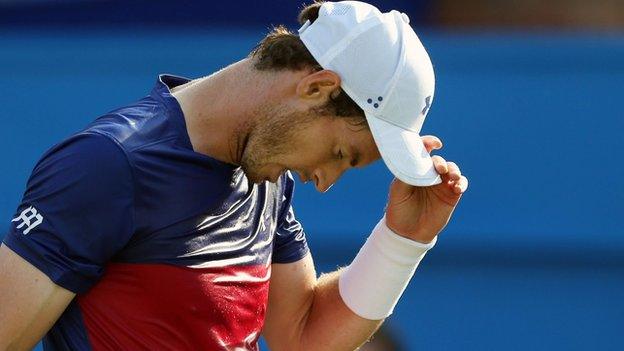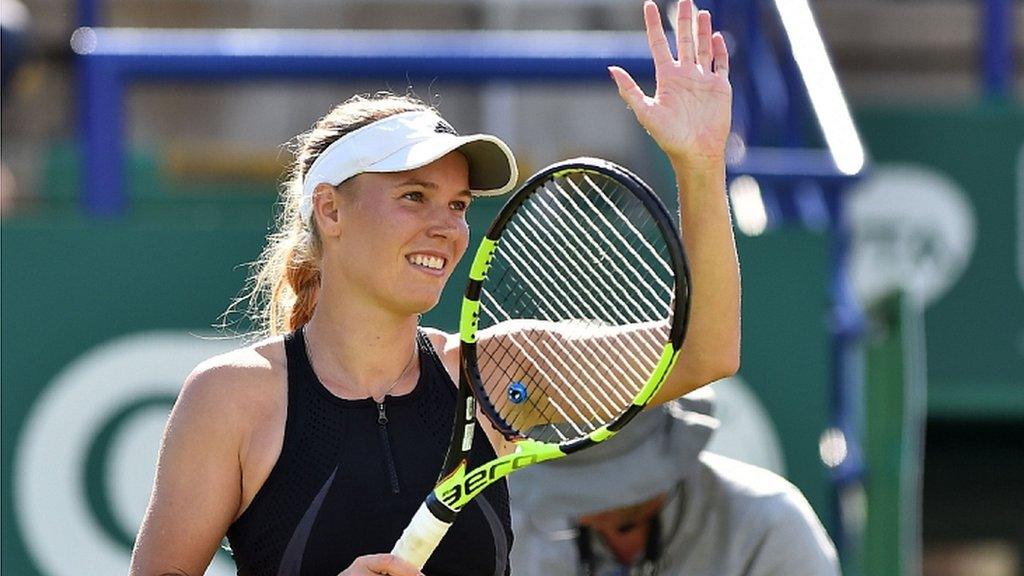Dan Evans: Great Britain Davis Cup player tests positive for cocaine
- Published
'I made a mistake' - Evans admits failed drugs test
Wimbledon on the BBC | |
|---|---|
Venue: All England Club Dates: 3-16 July | |
Coverage: Follow on BBC TV, BBC Radio and online with further coverage across Red Button, Connected TVs and BBC Sport website. |
British number three Dan Evans has announced he tested positive for cocaine in a drugs test taken in April.
The 27-year-old, who has played for Britain in the Davis Cup, learned of the failed test earlier this week and said he had "let a lot of people down".
"I made a mistake and I must face up to it," said the world number 50.
A player can be banned for up to four years for an anti-doping violation, according to International Tennis Federation (ITF) rules.
The ITF said Evans provided the positive sample at the Barcelona Open on 24 April and he will be provisionally suspended from 26 June.
"It's really important you know this was taken out of competition and in a context completely unrelated to tennis," said Evans, from Birmingham.
"I do not condone for one second to anyone that this is acceptable behaviour.
"I have let a lot of people down - my family, my coach, my team, sponsors, British Tennis and my fans. I can only deeply apologise from the bottom of my heart.
"This has been a sad and humbling experience."
Dan Evans factfile | |
|---|---|
Born | 23 May 1990, Birmingham |
Turned pro | 2006 |
Best Grand Slam performances | Australian Open: 4R (2016) |
French Open: 1R (2017) | |
Wimbledon: 3R (2016) | |
US Open: 3R (2013) and (2016) | |
ATP Tour titles | 0 |
ATP Tour finals | 1 (Sydney 2017) |
Career prize money | £1,053,266 |
2017 prize money | £319,132 |
Evans last played on 10 June at Surbiton, retiring with a calf injury before withdrawing from events in Nottingham, London and Eastbourne.
He was ranked 772nd in the world in April 2015 but had reached a career-high ranking of 41 in March this year.
He lost all three of his matches last month, going out in the first round at the French Open, Madrid Open and Rome Masters.
The Lawn Tennis Association (LTA), the governing body of British tennis, said it was "very disappointed" by the news.
"We absolutely condemn any form of drug-taking and will support the process which needs to take place," said LTA performance director Simon Timson.
"We are in touch with Dan and we will offer appropriate guidance, support and education to him on how best to address the issues he now faces."
How long will Evans be banned for?
Evans has accepted the finding and the ITF said the ban will begin on Monday, "pending determination of the case".
A ban of two years is possible if it can be proved the substance was taken "in a context unrelated to sport performance", according to the Tennis Anti-Doping Programme guidelines.
Spaniard Jose-Manuel Roman Gomez was given a four-year ban after testing positive for cocaine in 2015, while French world number 30 Richard Gasquet, external had a two-year ban overturned in 2009.
An ITF panel accepted Gasquet's claim that the substance was in his system after he kissed a woman who had taken cocaine in a nightclub.
Former world number one Martina Hingis, external was given a two-year ban in 2008 after testing positive for cocaine while competing at Wimbledon the previous year.
Pundits react to Evans' failed drugs test
'Evans has had chances'
Russell Fuller, BBC tennis correspondent:
Cocaine is a prohibited substance, classed as a stimulant, which is banned in competition.
Tennis' anti-doping programme states a four-year ban is the starting point, if guilt is established, but the suspension can be reduced in certain circumstances.
It is cut to two years if the player can persuade the tribunal the drug was used out of competition and "in a context unrelated to sport performance".
Evans used an almost identical set of words in his brief statement.
My reading of the rules is that, if successful, Evans could then try and argue he bore "no significant fault or negligence".
If he is able to make a convincing case, any suspension could be cut yet further - but he does face a minimum of one year away from the sport.
John Lloyd, BBC Sport commentator and 1977 Australian Open finalist:
The bottom line is how many chances do you get?
He has had so many in his career where we have written him off, done things like not trained and done the things he needed to, got in trouble and then came back.
It looked like he had finally broken through that with some tremendous performances and he was a world-class player. Now this has happened.
At some stage it has to change. It is very sad.
Davis Cup, Canada v Great Britain: Dan Evans beats Denis Shapovalov in opener
- Published23 June 2017

- Published22 June 2017

- Published24 June 2018
